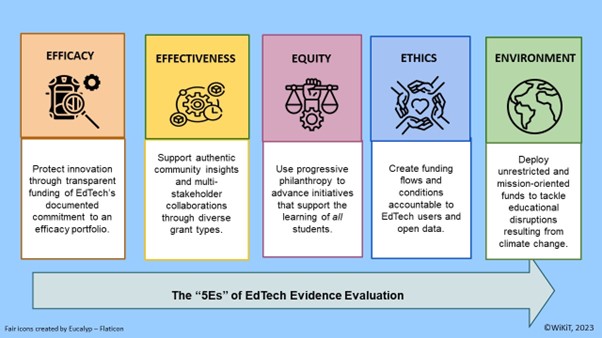Prolonged online teaching periods during pandemic lockdowns prompted a discussion on Educational Technologies (EdTech).
A series of damning reports, published now that some time has passed since pandemic lockdowns, showed that the most popular online teaching platforms have little or even negative impact on children’s learning. Many philanthropists have recognised that the lack of quality in children’s EdTech is not an issue of one platform, but a broader systems problem that hasn’t considered the entire educational technology pathway.
This systems lens on EdTech evidence was introduced by the Jacobs Foundation with their call for a ‘culture shift’ in how EdTech are funded, designed and implemented. Recognising the role funders play in how EdTech is scaled up, the foundation committed $44 million to stimulate greater cooperation between EdTech investors, start-ups, and researchers. The Evidence in EdTech movement, which integrates science with technologies, was strengthened.
Since the rise of the EdTech Evidence movement, foundations have increased their interest and funding in EdTech companies that have a causal, rather than casual, proof that they work. Given that many EdTech producers pursue ‘blended capital’ funding strategies, their evidence-building is funded by both private and philanthropic capital.
Philanthropic organisations looking to make a donation to an EdTech company often wonder about EdTech’s holistic impact on society. The evaluation of different aspects of evidence in EdTech involves considering five types of impact: Efficacy, Effectiveness, Equity, Ethics and Environment.
Efficacy: In the U.S., evidence is defined by ESSA efficacy standards. The federal government specified four tiers of evidence, with a clear description of the types of studies necessary for each tier. The top tier is randomised controlled trials (RCTs). RCT tests follow the medical model of education, where participants are randomly assigned to groups to check whether an intervention does or doesn’t work. RCTs are expensive and difficult to pull off, especially for smaller EdTech companies. So that efficacy standards don’t undermine innovation, philanthropy could support EdTech that have a documented commitment to building an ‘efficacy portfolio’. Here, funders need to define a role for their philanthropy that both contributes to efficacy outcomes and commitment level. Crucial in this process is transparency and funders’ open sharing of their EdTech efficacy expenditures, either on their own websites or those of national institutions (e.g. the What Works Clearinghouse).
Effectiveness: A rich portfolio of evidence identifies not only an EdTech’s impact on students’ learning but also users’ (teachers, families, children’s) views and experiences. Gathering user feedback, ratings on usability and iteratively implementing these insights into design requires diversification of funding. Funding organisations can support the process through a balance of grant types. For instance, they can fund a category of effectiveness (e.g. TestBeds) rather than the specific details of how testing occurs (e.g. national teacher surveys). Multi-stakeholder engagements (Researchers-Practitioners-Developers) are especially promising in achieving authentic insights, community engagement and long-term collaborations.
Equity: EdTech Evidence is a global issue and as such, requires a global solution developed by the global community. Currently, there is no global benchmark for EdTech quality, with different countries following different standards of evidence. To a great extent, the evidence narrative is controlled by market forces. These developments point to a clear mandate for progressive philanthropy. Philanthropic funders have a unique opportunity to turbocharge grants and social impact investments that advance equity issues. Possibilities include lobbying key stakeholders and partnering with like-minded funders to advance investments that support the learning of all children. EdTech challenges dedicated to underserved students and developing countries (see the recent MiT Solve EdTech Prizes for re-engaging learners or the VITAL Prize Challenge) are some examples.
Ethics: Documentation and evaluation of EdTech evidence can only be ethical if it has users’ voice at its core. Teachers and students are best positioned to measure the success of an EdTech project in their classroom, but their user data is often exclusively available to digital companies. (The issue of big technology companies withdrawing data from research investigations, has been a source of much frustration in academic circles for some time). A philanthropical impact is greater with objective evaluation based on primary data. Funders could support open data-sharing with dedicated financial flows accountable to EdTech users. The 5Rights Foundation provides exemplary methodologies for engaging young people in reporting their experiences with technologies, and advocacy statements for the importance of open data sharing.
Environment: EdTech can play multiple roles in the fight against climate change, including the development of programs that advocate for a just future and raise awareness about sustainability. Investing with a climate-first lens implies targeting geographies and communities that are most affected by climate change. It also implies dedicated support to companies that are committed to achieving carbon neutrality. The deployment of unrestricted funds in response to crises (e.g. EdTech headquartered in areas hit by a natural disaster) is as important as mission- and program-related investments that provide patient and stable capital for vulnerable communities. The organisations associated with UNESCO’s Futures of Education exemplify how philanthropy can use their influence to engage in advocacy towards long-term implementation of climate solutions.
In sum, the missing emphasis on evidence and its measurement in EdTech across countries, led to a decade of broken EdTech promises. The 5Es Framework can support the funders’ ability to unite the ecosystem in positively impacting children’s learning. Philanthropic organisations can play a vital role in ensuring that the EdTech evidence movement is not a trend but a long-term commitment to solving digital and educational inequity.
Natalia Kucirkova is a Professor of Early Childhood Education, co-founder of the university spin-out Wikit, AS, and Jacobs Foundation Research Fellow.







Comments (2)
Great insights! This is a fantastic blog that highlights how LEdTech has successfully scaled by leveraging remote teams. I’ve also explored related themes in my ultimate guide on IT staff augmentation, which delves into the flexibility and efficiency that remote teams bring to fast-growing industries. It could complement this discussion on how remote work models are reshaping the future of EdTech and beyond. Would love to hear your thoughts on it! https://medium.com/@mukesh.ram/edtech-an-industry-that-scaled-by-200-arr-with-remote-teams-64a3bd461ca3
Loved this article. RICH Learning is "the Immersive NeuroEducation company" that has identified the "pain" in the current education system and offers a catalyst for positive and effective educational change. We would like the opportunity to present our "pitch deck" to investors and or philanthropists alike.